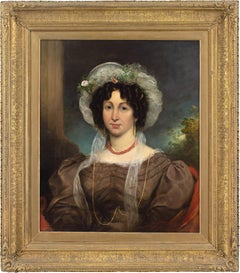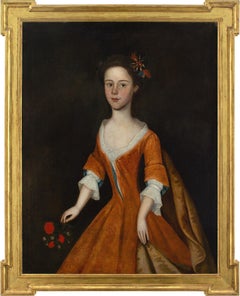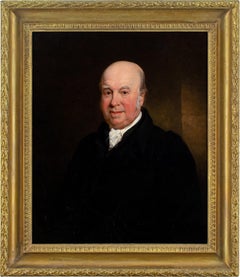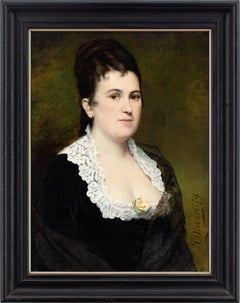Want more images or videos?
Request additional images or videos from the seller
1 of 13
Henry Pickering (Circle), Portrait Of A Gentleman With A Tricornc. 1755
c. 1755
$5,376.49List Price
About the Item
- Creation Year:c. 1755
- Dimensions:Height: 44 in (111.76 cm)Width: 36 in (91.44 cm)
- Medium:
- Movement & Style:
- Circle Of:Henry Pickering (1720 - 1770, English)
- Period:1750-1759
- Condition:Cleaned. Revarnished. Canvas relined. Faint stretcher marks. Craquelure throughout. The paint layer is stable. Frame with various marks and showing its age.
- Gallery Location:Cheltenham, GB
- Reference Number:1stDibs: LU2328215537122
About the Seller
5.0
Platinum Seller
Premium sellers with a 4.7+ rating and 24-hour response times
Established in 2017
1stDibs seller since 2023
244 sales on 1stDibs
Authenticity Guarantee
In the unlikely event there’s an issue with an item’s authenticity, contact us within 1 year for a full refund. DetailsMoney-Back Guarantee
If your item is not as described, is damaged in transit, or does not arrive, contact us within 7 days for a full refund. Details24-Hour Cancellation
You have a 24-hour grace period in which to reconsider your purchase, with no questions asked.Vetted Professional Sellers
Our world-class sellers must adhere to strict standards for service and quality, maintaining the integrity of our listings.Price-Match Guarantee
If you find that a seller listed the same item for a lower price elsewhere, we’ll match it.Trusted Global Delivery
Our best-in-class carrier network provides specialized shipping options worldwide, including custom delivery.You May Also Like
Men portrait with a hat
Located in BELEYMAS, FR
Henry William Pickersgill, attributed to
(London 1782 – London 1875)
Portrait of Captain Samuel Wright
Oil on canvas
H. 92 cm; L. 73 cm
Circa 1810/1815
Provenance:
– Brother of the ...
Category
1810s English School Portrait Paintings
Materials
Oil, Canvas
Antique Late 19th Century English Oil on Canvas Painting Female Portrait 1900
Located in Portland, OR
Antique English oil on canvas portrait painting, circa 1900. A very handsome Impressionist portrait of a youthful lady in Edwardian dress. Oil on canvas, signed to the upper left "F ...
Category
Early 1900s English School Portrait Paintings
Materials
Canvas, Oil
$1,900
H 33.25 in W 29.5 in D 2 in
A Portrait of a Lady
Located in San Francisco, CA
Viewing the delicacy and grace of this portrait, one can appreciate that British artist Rosa Koberwein (1876–1903) was well recognized during her career for producing excellent portr...
Category
Late 19th Century English School Portrait Paintings
Materials
Canvas, Oil
Sir Francis Dicksee Portrait, c. 1900
Located in New York, NY
Sir Francis Dicksee (English, 1853-1928)
Untitled (Portrait of a Woman), c. 1900
Oil on canvas; period frame
Sight: 13 1/4 in.
Framed: 21 1/8 x 21 1/8 x 3 3/8 in.
Frank Dicksee was a member of a noted artistic family, his father, brother, and sister Margaret were all well-known painters, and the family lived in the Bloomsbury area of London. He was initially trained by his father, before entering the Royal Academy schools in 1870. Amongst the visiting lecturers who trained him, were the famous senior academicians Leighton [1830-1896] and Millais [1829-1896].
Dicksee was a star student, earning many distinctions and medals. Like many other artists of the day his early career was largely spent in book illustration, as well as some stained glass window design. He started exhibiting at the RA in the mid 1870s, and also exhibited at the Grosvenor Gallery, though his real base was always the Academy. Dicksee made his reputation with Harmony, exhibited at the Academy in 1877, and bought by the Chantry Bequest.
Frank Dicksee was elected ARA in 1881, and became a full RA ten years later. Many of his pictures were of dramatic historical and legendary scenes. He also was a noted painter of elegant, highly-finished portraits of fashionable women, which of course helped to bring him material success. Many of these portraits are so beautiful, it is really difficult to disapprove of them - happy was the fashionable lady whose portrait was painted by Dicksee! He also painted landscapes.
Dicksee lived in St John's Wood, and remained a bachelor. He was, of course, one of the nineteenth century artists who outlived his time, and was, to his credit, very unhappy with developments in the early twentieth century. Rather surprisingly, Dicksee was elected President of the Royal Academy in 1924, fulfilling the role with panache and tact. Physically he was a tall, good-looking, patrician figure, with a charming easy-going manner. Like his predecessor but one Edward Poynter...
Category
Early 1900s English School Portrait Paintings
Materials
Oil, Canvas
$14,500
H 21.125 in W 21.125 in D 3.375 in
Portrait After John Constable, Sotheby's Provenance
By John Constable
Located in New York, NY
After John Constable (British, 1776-1837)
Portrait of A Man, c. 1800
Oil on canvas
23 3/4 x 19 3/4 in.
Framed: 34 x 29 3/4 x 2 3/4 in.
Sotheby'...
Category
19th Century English School Portrait Paintings
Materials
Canvas, Oil
Oil on Canvas Portrait of Mother and Child
Located in Fredericksburg, VA
This painting is unsigned but evidence shows that it is from a European school. It shows a mother with a child on her lap as well as a forest background. Likely wealthier patrons due...
Category
Mid-19th Century English School Portrait Paintings
Materials
Canvas, Oil
Portrait of a Gentleman Commoner at Oxford, 18th Century Oil on Canvas
By James Northcote b.1746
Located in London, GB
James Northcote
Portrait of a Gentleman Commoner at Oxford
Oil on canvas
Image size: 30 x 25 inches (76 x 63.5 cm)
Original gilt frame
This painting is a comparatively rare example ...
Category
18th Century English School Portrait Paintings
Materials
Canvas, Oil
Portrait of Thomas Cooper Gotch, 19th Century Oil Painting
Located in London, GB
Oil on canvas on board
Image size: 7 x 5¼ inches (18 x 13.5 cm)
Framed
This portrait of Thomas Gotch is by his lifelong friend and confidante, Jane Ross, whom he met at Heatherley’s...
Category
1880s English School Portrait Paintings
Materials
Canvas, Oil
Self Portrait, 20th Century Female Artist Oil Painting
By Joan Fairfax Whiteside ARRC FMAA
Located in London, GB
Oil on canvas
Image size: 17 3/4 x 13 inches (45 x 33 cm)
Contemporary hand made frame and oval mount
The Artist
Joan Fairfax Whiteside was a prodigious artist and illustrator. Bor...
Category
Mid-20th Century English School Portrait Paintings
Materials
Canvas, Oil
$1,656
H 17.75 in W 13 in
Armand Emmanuel du Plessis, 5th Duke of Richelieu
Located in London, GB
Oil on canvas
Image size: 10 x 7 1/2 inches (25.5 x 19 cm)
Contemporary gilt frame
This painting is a copy of Thomas Lawrence’s 1822 portrait of Armand Emmanuel du Plessis, Duke of ...
Category
19th Century English School Portrait Paintings
Materials
Oil, Canvas
$12,837
Free Shipping
H 10 in W 7.5 in
More From This Seller
View AllGeorge Clint ARA (Attributed), Portrait Of A Lady In A Brown Dress
Located in Cheltenham, GB
This early 19th-century half-length portrait attributed to British artist George Clint ARA (1770-1854) depicts a young lady wearing a beautiful brown dress, bonnet decorated with small flowers, gold earrings and coral necklace. Clint was a distinguished painter and mezzotint engraver predominantly known for portraiture and dramatic scenes.
Set before an evocative classically-inspired backdrop, she looks out from across the centuries with a composed demeanour. Adorned in the latest fashions, oversized ‘gigot’ sleeves, a delicately-poised bonnet, and a coral necklace for good luck. It’s a charming portrayal by a masterful hand.
Born at Drury Lane, in the heart of London’s West End, George Clint was destined to lead an exuberant life amid the spectacle of theatreland. His father, Michael Clint, was a hairdresser during a time of “hair pomatum, whalebone, wire, lace gauze, and feathers” - so young George would have encountered a variety of ‘characters’ during his childhood.
But despite these elevated surroundings, he soon discovered the darker side of London when thrust into the world of employment. Apprenticed initially as a fishmonger, he trained under a ferocious master who was known to beat him. The hours were unsocial, the conditions rank, and the work was brutal. He soon quit but subsequently found himself toiling for a corrupt attorney who demanded he undertake unscrupulous acts on his behalf.
Seeking a less volatile role, he turned next to house painting, at which he excelled. Commissioned, among other projects, to paint the stones of the arches in the nave of Westminster Abbey. Aside from an incident whereby he almost fell from the second story of a building, all was going well.
Following his marriage in 1792 to Sarah Coxhead, a farmer’s daughter, he began work in earnest as a painter of miniatures, determined to forge a career. Robert William Buss’ memoir celebrates Clint’s success as a miniaturist, stating that “great manual excellence was united with that chaste, delicate feeling for female beauty which characterised all Mr. Clint's portraits of ladies.”
Until this point, it appears he was predominantly self-taught, presumably constrained by a lack of finances. But from hereon in, his industrious nature coupled with several fortunate encounters, led to him developing an enviable talent for both painting and engraving. During the early 19th-century, the acquaintances one kept could make or break your fortunes and perhaps acutely aware of this, Clint’s ‘society’ was an ever-evolving circle of influential personalities.
He was “initiated into the mysteries of engraving” by Edward Bell (act.1794-1819) and produced numerous works after the foremost artists, such as George Stubbs, John Hoppner, and Thomas Lawrence. Following a commission from Lawrence, he struck up a long-term friendship.
Admired for his skill as a mezzotint engraver, he sought next to hone his technique in oils and, as with many aspiring portraitists, his first work in this respect was a depiction of his beloved wife. The pair were both delighted with it, yet over time Clint began to doubt himself and sought the validation of a superior hand - that of Sir William Beechey (1753-1839). However, paralysed with insecurity, he couldn’t face the potential criticism, so his wife took it instead - “with a child under one arm and the portrait in the other”. The result was immeasurably more positive than he’d envisaged and he became closely associated with Beechey until his death in 1839.
Numerous commissions followed from the landed gentry including Lord Egremont, Lord Spencer, and Lord Essex. But also from the theatrical community who would fill his studio at 83 Gower Street, Bloomsbury. His connections within the world of acting led to notable works such as ‘Malvolio and Sir Toby’ (from William Shakespeare's 'Twelfth Night', Act II, Scene iii)’ and ‘Harriet Smithson as Miss Dorillon, in Wives as They Were, and Maids as They Are’.
While his efforts in mezzotint included several contributions to JMW Turner’s Liber Studiorum.
As a measure of his success, Clint was elected an Associate of the Royal Academy in 1821 - a position he later relinquished for personal reasons. Today, he’s represented in numerous public collections including at The British Museum, Harvard Art Museums, The Met, V&A, Yale Center for British Art, and the National Portrait Gallery.
“The respect in which he was held, not only by his brother artists, but by an immense number of eminent men in various professions, and others of the highest rank, was the result of a rare combination of talent, candour, suavity of manner, and integrity of purpose”. [Obituary, 1854].
Housed in a period gilt frame, which is probably original.
Learn more about George Clint ARA in our directory.
Labels & Inscriptions: Supplier’s stencil from Rowney & Forster. The National Portrait Gallery holds a database of supplier’s stencils over the decades. The one here is also presented on two other works by George Clint. ‘Falstaff’s Assignation with Mrs Ford...
Category
1830s English School Portrait Paintings
Materials
Oil, Canvas
Mid-18th-Century English School, Portrait Of A Girl With A Posy
Located in Cheltenham, GB
This exceedingly charming mid-18th-century English oil painting depicts a girl wearing a red gown with a train over a white petticoat. She’s holding a posy or nosegay.
Evidently once commissioned for an English country house, the identity of this young lady remains a mystery. Her gown appears to be inspired by the popular ‘robe à la française...
Category
1740s English School Portrait Paintings
Materials
Oil, Canvas
Early 19th-Century English School Portrait Of Samuel Jones Of Skeyton, Norfolk
Located in Cheltenham, GB
This fine early 19th-century English oil painting depicts Samuel Jones of Skeyton, Norfolk, smartly attired in a black coat with white cravat. The portrait was previously in the coll...
Category
1830s Portrait Paintings
Materials
Oil, Canvas
Jean Baptiste Discart, Portrait Of A Lady With A Yellow Rose
Located in Cheltenham, GB
This fine late 19th-century portrait by renowned Italian artist Jean Baptiste Discart (1856-1944) depicts a lady wearing a black dress embellished with a lace collar, together with a single yellow rose. It’s catalogued (#3) in Theo P.G. Kralt’s book, Jean Baptiste Discart, Orientalist Paintings and Dutch Portraits.
A provocative rose draws one’s eye to the ‘décolletage’. Was it her idea or the bold suggestion of a young Discart, just 21, and bursting with energy? The style of dress came to the fore during the late 19th century and was regarded as somewhat improper by a stoic older generation. But, of course, the glaring eyes only encouraged young ladies to rebel and adopt the fashion regardless.
Little is known about the sitter, but it’s conceivable that she’s either Austrian or French, given Discart’s known locations in 1879. It was completed during his training. It bears all the hallmarks of a young and confident painter looking to establish himself.
Born in Modena, Italy, Discart’s father, Francesco Ferdinando, moved in particularly distinguished circles and worked for the Duke of Modena. Indeed, the Duke became young Jean’s godfather, so the pair were well-connected. One can only imagine the ostentatious interiors that he witnessed during childhood, and it’s conceivable that these experiences inspired his appreciation for the finer things in life.
At 14, he was enrolled at the Academy of Fine Arts in Vienna, where he trained under the German painter, Anselm Feuerbach (1829-1880). It seems that he stayed here until Feuerbach’s retirement in 1877 when the course was handed over to Leopold Carl Müller (1834-1892). His short time under Müller, known for his exquisite ‘orientalist’ work, would be transformative.
From here, he left Vienna to immerse himself in the cosmopolitan environs of the French Capital and exhibited at the Paris Salon in 1884. At that point in time, Paris was an exciting place for an emerging artist. In 1884, the Société des Artistes Indépendants held their first show, which included works by Paul Cézanne...
Category
Late 19th Century Victorian Portrait Paintings
Materials
Canvas, Oil
W.S. Cooper, A Bay Hunter & Groom In A Landscape
Located in Cheltenham, GB
This early 19th-century oil painting by English artist W.S. Cooper (act. 1832-1834) depicts a bay hunter and groom in a landscape with a hunt beyond.
Once hanging in a proud English...
Category
1830s Victorian Animal Paintings
Materials
Oil, Canvas
Mid-19th-Century French School, A Pair Of Nanas, 2 x Oil Paintings
Located in Cheltenham, GB
This charming pair of mid-19th-century French School portraits depicts two grandmothers, both presumably widows, wearing black gowns and white bonnets.
Alas, the identity of these r...
Category
Mid-19th Century Portrait Paintings
Materials
Canvas, Oil
Recently Viewed
View AllMore Ways To Browse
Antique Pickers
Sara Scribner
Small Oil Portrait
Used Satellite Dish
Will Cotton
1888 Oil Portraits
1940s British Painting
A Churchill Painting
Andy Warhol Studio 54
Battista Salvi
Battista Sassoferrato
Female Self Portrait Paintings
Floris Frans
Girl Privates
Jack King
Jorunn Mulen
Margaret Thomas
Oil Painting And Sir



